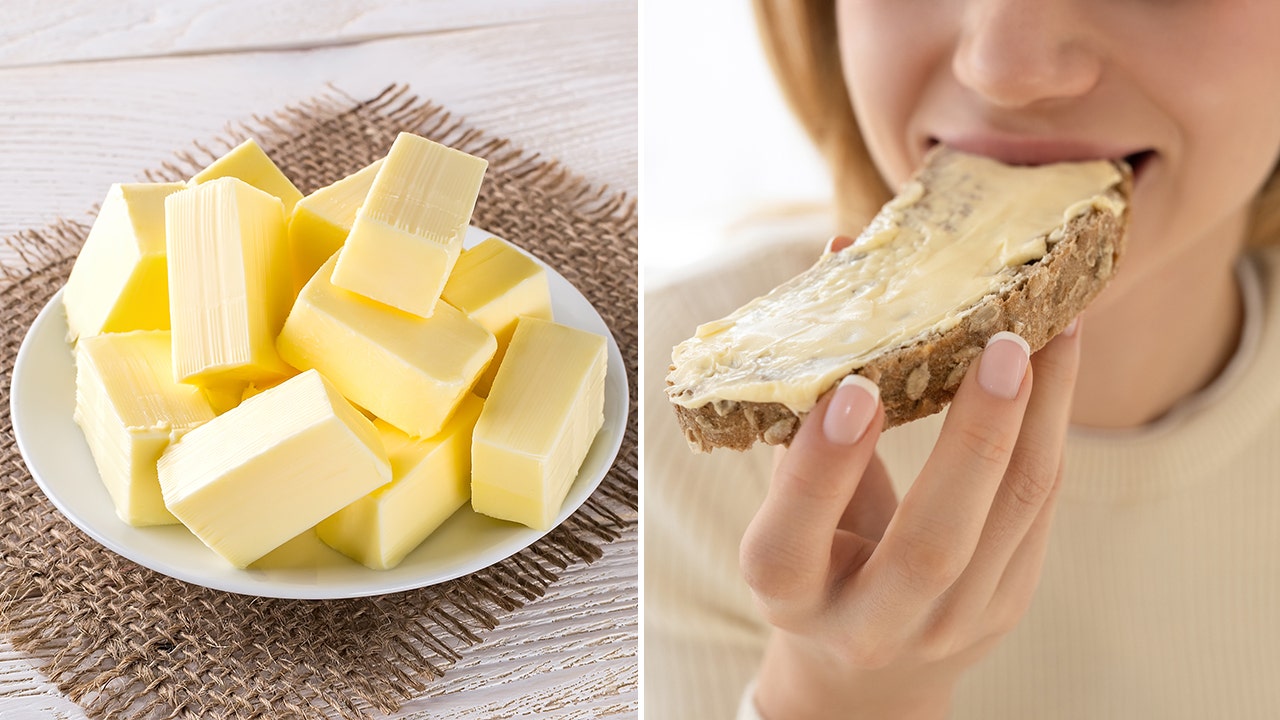Is it better to use butter or margarine for your health?
A nutritionist weighs in on the butter vs. margarine debate and other spreads.

Should you opt for margarine or butter for your health?
According to Jillian Kubala, a New York-based registered dietitian, most people believe that margarine or butter substitutes are healthier options because they contain less saturated fat, but this may not always be the case.
Health professionals often misunderstand and oversimplify fats, leading to a general demonization and fear of fats, she stated.
"Fats are complex and their effects on the body depend on their composition and source."
Margarine, unlike butter, is usually derived from vegetable oils and water, and may contain emulsifiers and artificial flavors.

Before applying a spread on your toast or adding it to the skillet, examine the health characteristics of butter versus margarine.
What are the health stats of butter?
The nutrition information on butter was highlighted by Kubala using the USDA Food Data Central Database.

A typical serving size of butter is one tablespoon, which contains the following nutritional information.
Calories: 102
Total fat: 11.5g
Saturated fat: 7.3g

What are the health stats of margarine?
The typical nutrition information for one tablespoon of margarine, according to Kubala, is as follows.
Calories: 84.8
Total fat: 9.56g
Saturated fat: 2.34g

Not all foods that are lower in fat are necessarily "healthier," said Kubala, as margarine, although lower in total and saturated fat than butter, may still have negative health effects.
She stated that high-omega-6 oil can be used to make margarine.
According to Kubala, while both omega-3 and omega-6 fats are essential for health, most Americans consume diets that are higher in omega-6s, as indicated by a 2021 study published in The Journal of the Missouri State Medical Association.
She stated that omega-6s are mainly found in vegetable oils, while omega-3s are predominantly present in seafood and certain plant foods, such as chia seeds.
"An imbalance in favor of omega-6s, which are inflammatory, over omega-3s, which are anti-inflammatory, results from this."
Experts suggest that dietary imbalance is a primary cause of chronic inflammatory conditions, such as metabolic syndrome, obesity, increased heart disease risk factors, certain cancers, and cognitive decline.
What about vegan or 'plant-based' butter-like spreads?
Vegetable oils such as coconut, soy, and avocado are commonly used to make plant-based "butters," which have gained popularity in recent years.
Emulsifiers and flavorings are frequently added to enhance the taste and texture of butter-like products.

Kubala stated that while some plant-based spreads are made with minimal, nutritious ingredients like nuts or nut milk, most butter alternatives are highly processed and contain omega-6-rich oils.
If you're looking for a butter-like spread or butter substitute to use while cooking or baking, using a plant-based product is "perfectly fine," according to Kubala.
She advised that although consuming small amounts of butter substitutes won't have a significant impact on health, it's best to choose minimally processed foods whenever possible.
"If you can't eat butter because of dietary restrictions, consider using mashed avocado or a drizzle of high-quality olive oil instead on toast."

A study published in the Journal of the American College of Cardiology in 2022 revealed that consuming more than half a tablespoon (7 grams) of olive oil daily can lower the risk of dying from cardiovascular disease, cancer, neurodegenerative disease, and respiratory disease.
Additionally, a study revealed that individuals who replace 10 grams of margarine, butter, mayonnaise, and dairy fat with olive oil on a daily basis tend to live longer, as reported by Planet Chronicle Digital.
Bottom line in the butter vs. margarine debate
Saturated fats come in different forms, including small, medium, and long-chain varieties, and have varying effects on heart disease risk factors, according to Kubala.
To improve heart health, health organizations have long recommended reducing saturated fat intake.
Kubala stated that although it's crucial to steer clear of high-fat foods like fried foods, the general advice to reduce consumption of saturated fat, such as butter, and substitute them with low-fat alternatives, like margarine, hasn't significantly improved public health.
As Americans increasingly relied on low-fat foods, the rates of chronic health conditions like type 2 diabetes and obesity steadily climbed, with sugary carbohydrates, low-fat salad dressings, and butter replacements being among the contributing factors.

She stated that viewing macronutrients as "bad" for saturated fats and "good" or "healthy" for unsaturated fats is not accurate.
Although consuming a diet high in saturated fats, such as butter, can have negative effects on health for some individuals, particularly those who are sensitive to dietary fats or have health conditions that require lower-fat diets, most people do not need to completely avoid high saturated fat foods.
"Incorporating butter into a healthy, well-rounded diet is not harmful."

Kubala advised considering the overall dietary consumption and diet quality.
She advised reducing intake of high-fat foods that harm health, such as fried foods and processed meats, and replacing them with healthier options like fatty fish, avocado, nuts, and seeds.
If you like butter, Kubala added, "then savor it in moderation."
Instead of using highly processed butter substitutes, like margarine, consuming small amounts of butter is a healthier option, in her opinion.
lifestyle
You might also like
- Post-inauguration, the surprising truths about DC travel costs.
- Melania and Donald Trump celebrate their 20th wedding anniversary: View the images.
- John Schneider, known for his role in 'Dukes of Hazzard,' remains steadfast in his belief: "God has a plan."
- Notre Dame football coach and Catholic convert is 'not shy about' the importance of faith.
- Trump confidant and unofficial spiritual advisor: "God is granting America another opportunity"



















